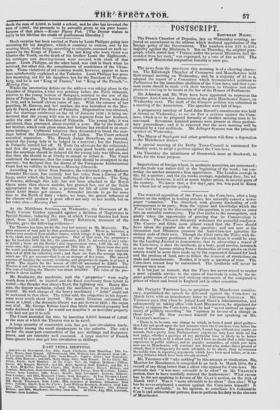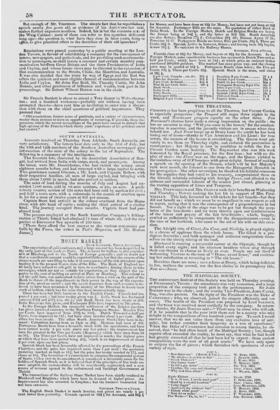Mr. POULETT THOMSON has, to propitiate his Manchester constitu- ency,
republished the speech he delivered against the Corn-laws in March 1834, with an introductory letter to Alderman KERSHAW. Mr. THOMSON says, that -when he joined Lord GREY'S Administration, and subsequently on taking office with Lord Mamoru:NH, he stipulated for liberty to oppose the Corn-laws ; and he had "never omitted an oppor- tunity of publicly recording" his "opinion in flivour of a change in these laws." He thus excuses himself for not speaking on Mr. VILLIERS'S motion- " There is, to be sure, one charge to which, in firm, I must plead guilty—. that I did not speak upon the last occasion when the Corn-laws were before the House of Commons. But upon this point, I must beg, without any vanity, to remark, that a pretty long Parliamentary experience may have made me the best judge, whether a question at any particular time is likely to be better served by a speech or by a silent vote ; and I have no doubt that a little longer experience in public matte's, and in popular assemblies, of which you have now one in Manchester, will convince our friend who makes this a ground of attack, that it is frequently far more advisable to be silent, than to consume the public time in repeating arguments which have been used before, or in ex- posing fallacies which have been already overset."
Mr. THOMSON will "take nothing" by this attempt at vindication. He, Member for Manchester, is compelled to go back to March 1834, for a record of any thing better than a silent -vote against the Corn-laws. He pretends that "it was more advisable to be silent" on Mr. VILLIERS'S motion, than to have manfully resisted the landowners! What excuse has he for not speaking in favour of Mr. CLAY'S motion, on the 16th of March 1837? 'Was it "more advisable to be silent" then also ? Why has he never originated a motion against the Corn-laws himself? It was "more advisable," in his opinion, to conciliate his fashionable ftien is and aristocratical patrons, than to perform his duty bathe electors of Manchester. But enough of Mr. THOMSON. The simple fact that he republishes a speech nearly five years old, as evidence of his Anti-Corn-law zeal, makes further exposure needless. Indeed, his is but the common ei s.; of the Whig Cabinet : most of them can refer to fine speeches delivered long ago-the question is, what have they done in later years, being in office, to give practical effect to the doctrines of their old speeches?



























 Previous page
Previous page